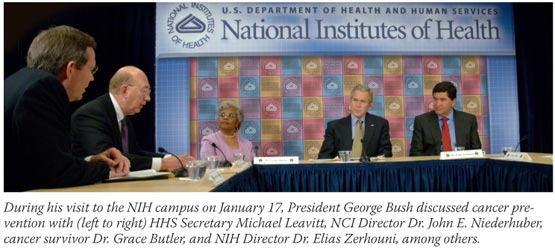
Good News on Cancer Deaths Underscores Progress
Last week, the entire nation received the excellent news that, for the second year in a row - and for only the second time ever - the actual number of cancer deaths in the United States fell.
As a nation, our population is still growing and living longer, which makes this decline even more significant. It also further demonstrates the importance of closely tracking and studying incidence and death rates.

Our investment in programs like SEER, for example, has allowed us to track the stabilization of cancer incidence rates and the overall decline in cancer death rates since the early 1990s. And through CISNET, NCI is supporting a consortium of researchers with expertise in modeling to help determine the relative contributions of various interventions to incidence and mortality rates. These important programs are greatly informing our efforts to lessen the cancer burden.
NCI had a tremendous opportunity last week to share the good news of the decline in deaths from cancer with President Bush. The President participated in a roundtable discussion on cancer and research with HHS Secretary Mike Leavitt, NIH Director Dr. Elias Zerhouni, National Human Genome Research Institute Director Dr. Francis Collins, and me. Two cancer survivors, Becky Fisher and Dr. Grace Butler, who is a member of the NCI Director's Consumer Liaison Group, also participated and both had powerful personal messages about their cancer experience that clearly touched the President.
It was the President's fifth visit to NIH and the first time that his focus was on the impact of cancer research achievements. At the roundtable, I had the opportunity to explain to President Bush some of the exciting genetics-related initiatives NCI is leading, including the Cancer Genetic Markers of Susceptibility and The Cancer Genome Atlas. As I told the President, programs such as these are laying the foundation for our ability to identify individuals at risk, develop prevention strategies, and design the next generation of cancer therapies. This new knowledge will greatly contribute to improvements in treatment and the continued reductions in cancer deaths.
Earlier in the day, President Bush toured the laboratory of Dr. Marston Linehan, chief of the Urologic Oncology Branch in NCI's Center for Cancer Research, and went to the clinical floor to visit with two of his patients. Over the past two decades, Dr. Linehan has used the power of genetics to pinpoint new molecular targets for therapy for kidney cancer, a disease that, until recently, has proven to be an intractable foe.
In addition to using genetics research to identify potential therapeutic targets, research into identifying a tumor's genetic makeup via gene-expression profiles is already beginning to influence decisions about patient care with existing therapies for breast cancer and lymphoma.
The advances being made in these and many other areas offer real hope for continuous progress. Even so, the new ACS report again confirms that minority and low-income populations shoulder a disproportionate cancer burden and aren't benefiting equally from these important advances. One way NCI is attempting to address this problem is by bringing the results of postgenomics science to patients where they live through the NCI Community Cancer Centers Program, with the hope of broadening access to clinical trials and to cutting-edge prevention, diagnosis, and treatment interventions.
With this new report, there is great cause for optimism, but an optimism that should be tempered by an understanding of the very real hurdles to progress we still face. These are challenges that we must address as a community. In doing so, such encouraging trends will become the rule, not the exception.
Dr. John E. Niederhuber
Director, National Cancer Institute
|